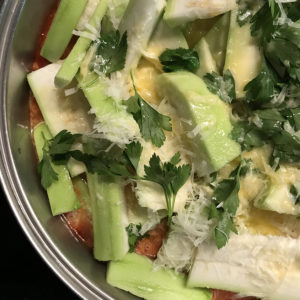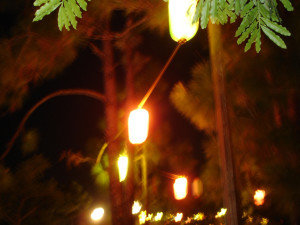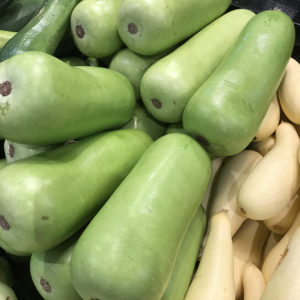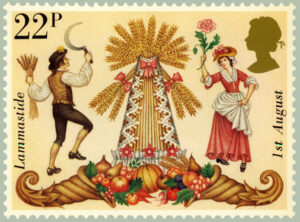And here we are at mid-August. The Dog Days are over: Sirius, the Dog Star, which had been rising with the sun since early July, now rises on its own. It’s another of the old stories that return year after year. Early astronomers observed the two stars rising together each summer and thought for sure this contributed to making our days hotter. We know better now, but the term Dog Days persists, and I’m glad it does, for if it didn’t, I wouldn’t have that great song by Florence + the Machine popping into my head each mid-August.
It is Obon weekend, and so Florence is sharing space in my head with taiko drummers and the music of Bon Odori dancing, the community centerpiece of the festival of Japan that welcomes the dead home again for a summer visit. Growing up here in South Florida, in the presence of the Morikami, Obon was long an important part of August and summer. Some years I’d go with my family, some years on my own, some years with my little nephews in tow. I remember the heat and humidity, the summer thunderstorms that often accompanied the festival, the smell of pennyroyal in the air, which we would apply to ourselves in an effort to ward off mosquitos. But mostly I remember the colors, especially as the afternoon darkened into night, electric lanterns strung through the pines, glowing red and green and blue, festival vendors, and then the central pavilion –– the yagura –– painted in red and white stripes. There on the yagura were the taiko drummers and flutists, and the dancers, making their way around and around the yagura in mysterious movement. These, to me, were some of the most magical things I’ve experienced, and how serendipitous that I got to experience it here, in this strange green land that gets stranger and stranger and yet is filled with so much beauty and emotion that it sometimes sucks all the breath out of me.
And then, of course, the illuminated lanterns, set sail on the water: Transportation for the souls who were visiting, bringing them back to their distant shore.
For my family, of course, we remember my grandmother, Assunta, who was named for the Feast of the Assumption. She was born the Fifteenth of August, 1898, and so her parents chose her name in honor of the day. The feast is a holiday throughout Italy and most of Europe, though in Italy it is also memorable as the start of Ferragosto, when many Italians close up shop and head to the sea or to the mountains for a week away from the ordinary.
For her birthday, Grandma always fixed a simple Ferragosto supper of cucuzza longa simmered with eggs. And though she is gone these 35 years now, still we prepare this same dinner for the Fifteenth of August. It is hearty peasant fare that is quick and easy to prepare, which makes it the perfect sustenance for a hot evening in late summer, especially when it is paired with a crusty loaf and some wine––perhaps a sparkling white or a rosé, or maybe, if you have someone like Grandpa in your life, a pitcher full of the finest summer peaches, sliced, with red wine poured over them and set in the refrigerator for just a few minutes before dinner is served. It’s so easy to make, and so delicious. I invite you to join us.
You’ll need to first get hold of cucuzza longa. This translates to “long squash” and you may find them labeled that way at your local market. They are not a squash at all, but actually an edible gourd, which, left to their own devices, will grow to two or three feet in length and might end up straight as pins or as fascinating coiled shapes, like serpents. In markets, though, where uniformity is prized, chances are you’ll find them looking just like the ones in the photo above. This year, I’ve been to three local markets –– one a farmers’ market, the others Italian markets –– and I’ve had no luck finding my beloved cucuzzi. In a pinch, you can substitute zucchini… but the cucuzza is different and so much better. This year, we’ll be going with zucchini.
Here’s Mom’s recipe to prepare your traditional Ferragosto dinner. She learnt it from Grandma, who learnt it from Mom’s Great Grandma, and so on and so on… which is what I love about a meal like this: It’s not just dinner; it is, as well, a communion with others across time and space. Much like Obon, and much like Dia de Los Muertos and I Morti, the holidays honoring the dead that will come this fall. I think there is powerful magic in all of these things, and yet they are rooted in the simple act of preparing food and sitting at the table.
F E R R A G O S T O S U P P E R
3 cucuzza longa (or zucchini)
1 large onion
olive oil
1 can crushed tomatoes
8 to 12 eggs
1/2 cup (or more) grated cheese: Romano or Locatelli or Parmigiano-Reggiano
flat leaf parsley, leaves removed from stems
fresh basil
salt & pepper
Wash and peel the cucuzza using a knife or a vegetable peeler (no need to peel if you are using zucchini), then cut into thick slices, each slice about 3″ long (you’re cutting lengthwise with the cucuzza, as opposed to slicing rounds). Chop the onion roughly and in a large pot, sauté the onion in olive oil until translucent and just beginning to brown. Add the crushed tomatoes to the cooked onion. Let simmer about 10 minutes.
Meanwhile, in a large bowl, beat the eggs with a whisk, then add the parsley and grated cheese. (A note here about measurements: recipes like these, handed down from generation to generation, don’t come with precise measurements. You put a handful of this, a pinch of that. As Grandma would say (though she would say it in her Lucerine dialect): The more you put, the more you find.) Once the tomato/onion mixture has simmered, add about one quarter of the sliced cucuzza, followed by about one quarter of the egg and cheese mixture. Continue layering cucuzza and the egg mixture until everything is in the pot. Add a handful of fresh basil leaves; season with salt and pepper. Simmer, covered, without disturbing, until the egg is set and the cucuzza is tender (about an hour, maybe less).

All the ingredients, in the pot, about to be simmered.
This one-pot summer meal will serve 6 to 8, especially if it’s served alongside warm, crusty bread, and perhaps a simple salad of escarole dressed with olive oil, wine vinegar, and salt. It’s delicious. And it was on our table pretty much each and every one of Grandma’s birthdays. Grandpa certainly loved it. He would have eaten his Ferragosto supper and then made a simple hand gesture, his finger pushed into his cheek with a forward twisting motion, proclaiming it Saporite!


